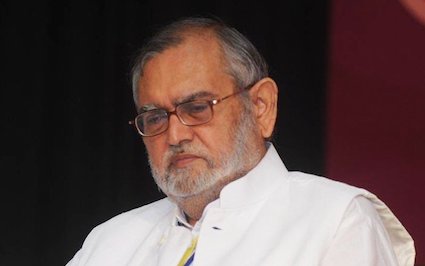Head of Indian govt’s minorities body says Naik’s fears of unfair trial well grounded

Zafarul-Islam Khan, chairman of Indian government-backed Delhi Minorities Commission, says the BJP government under Modi has been on a witch-hunt for its critics.
(FMT) – The head of an Indian government agency tasked with protecting religious minorities agrees that Dr Zakir Naik’s speeches could be offensive to Hindus and questions his methods, but adds that the preacher has reasonable grounds to fear persecution and unfair trial under the Narendra Modi government.
Zafarul-Islam Khan, a prominent activist who chairs the federal-backed Delhi Minorities Commission – an agency which safeguards the rights of Muslims, Christians, Sikhs, Buddhists and Parsis – also believes the recent money laundering charges are part of a larger campaign by extremist Hindu forces to silence Naik.
“The Hindutva forces have had unbridled power since Modi came to power in May 2014. They are misusing it against their opponents, real or imaginary,” Khan, who is the son of one of contemporary India’s most illustrious Muslim voices, told FMT.
Khan’s father is Wahiduddin Khan, who advocates Gandhian non-violence and has been bestowed with the Padma Bhushan, India’s third highest civilian honour.
Wahiduddin had in the past criticised Naik’s Islamic missionary methods, a view Khan also holds to.
But he said while Naik’s approach has been combative, he would not accuse him of abusing other beliefs, particularly Hinduism.
“I think Zakir Naik may be blunt and offensive at times but he does not abuse other religions,” said Khan.
“I think he should be more cautious. He used to hold huge open-air televised conferences in parks and stadiums where Hindu leaders were invited and ‘insulted’ in their view. More offence was taken over Hindus standing up after his lectures and announcing their conversion to Islam. This offended Hindus,” he added.
Malaysian police are investigating Zakir Naik regarding accusations of inciting racial sentiments.
Naik came under investigation in Malaysia following speeches critical of the non-Muslim communities here. He reportedly described ethnic Chinese as “guests” when responding to growing calls for him to be deported.
However, he has denied stoking racial sentiments, saying he is a victim of a vilification campaign by Modi’s supporters.
He previously said he would not return to India, believing he would not be accorded a fair trial under the BJP government.
Khan said Naik was probably naive about India’s commitment to free speech and “took for real the constitutional guarantees of freedom of expression and right to profess and propagate any faith”.
“In fact, these rights exist more on paper than in reality. Any conversion from Hinduism to another religion is considered a threat to Hindus and the country,” he added.
He said the problem is compounded by what he called the current leadership’s double standards when it comes to hurling accusations of threatening communal harmony.
“In addition, there are umpteen Hindu militias which take the law into their hands while the state apparatus looks the other way, to enforce these Hindutva objectives professed by RSS and supported by its political wing, the BJP which is now ruling India,” he said, referring to Rashtriya Swayamsevak Sangh, a right-wing organisation linked to the ruling party that has been blamed for communal riots over the decades.
Khan said he does not consider Naik part of India’s who’s who of Muslim scholars.
“He is influential and has a huge following due to his televised debates and Peace TV appearances, but he is not a scholar as such,” he said, adding that Naik appeared to have followed the approach of the late South African missionary Ahmad Deedat, who famously debated with Christian theologians in the early 80s.
Despite his reservations about Naik’s approach to propagating Islam, Khan believes that Naik will not get justice under the “circumstances of witch-hunting and official vilification”.
“This is true. The Indian judiciary has been quite compromised under the current government which believes in bulldozing its decisions,” he said, adding that Prime Minister Dr Mahathir Mohamad has a point in his criticism of the Indian judiciary in Naik’s context.
“I think Malaysia did the right thing. Naik will not get justice under the current Indian dispensation.”

